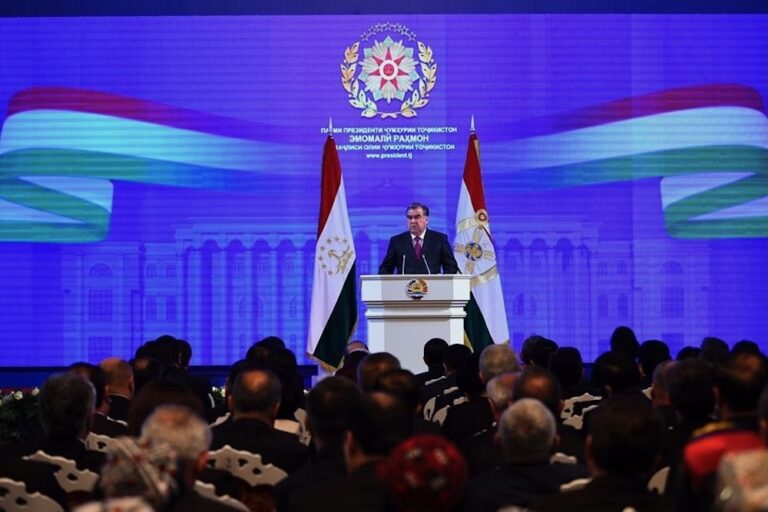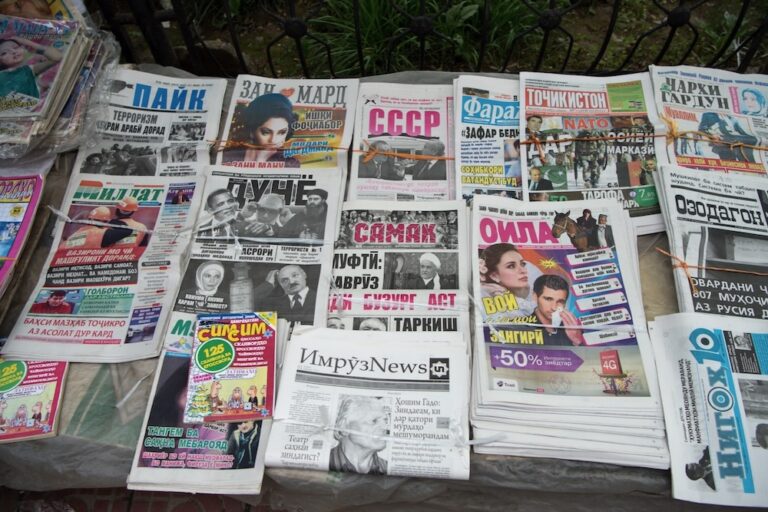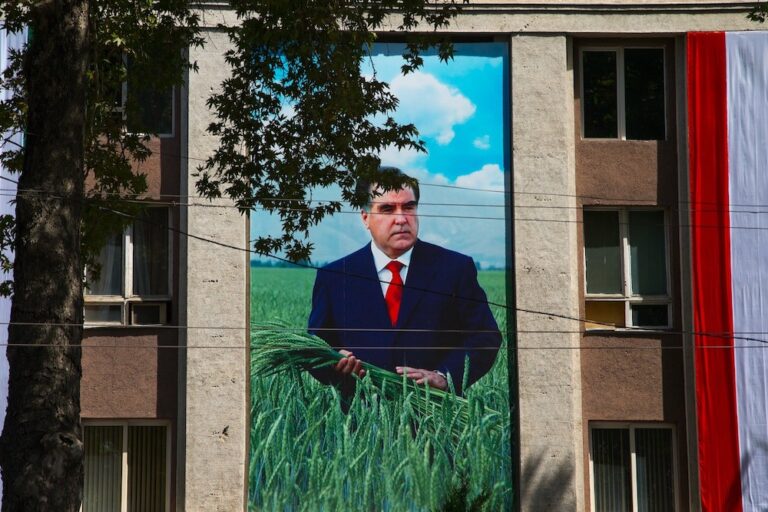(CPJ/IFEX) – The following is a 24 July 2003 CPJ press release: CPJ DELEGATION CALLS FOR GREATER PRESS ACCESS AND AN END TO IMPUNITY IN TAJIKISTAN Dushanbe, July 24, 2003-A delegation from the Committee to Protect Journalists (CPJ) called on the government of Tajikistan to combat the culture of fear and self-censorship lingering from its […]
(CPJ/IFEX) – The following is a 24 July 2003 CPJ press release:
CPJ DELEGATION CALLS FOR GREATER PRESS ACCESS AND AN END TO IMPUNITY IN TAJIKISTAN
Dushanbe, July 24, 2003-A delegation from the Committee to Protect Journalists (CPJ) called on the government of Tajikistan to combat the culture of fear and self-censorship lingering from its bloody 1992-1997 civil war by investigating and prosecuting those responsible for the murders of dozens of journalists during that period.
The delegation also called on the government to reverse its culture of secrecy by making its activities and deliberations more accessible to journalists and the public.
The delegation-which included Pulitzer Prize-winning journalist Josh Friedman, a CPJ board member and professor of journalism at Columbia University; CPJ deputy director Joel Simon; and Europe and Central Asia program coordinator Alex Lupis-met with government officials, journalists, and diplomats. During three days of intensive meetings, the delegation expressed deep concerns that those who murdered journalists during the civil war have not been brought to justice.
Journalists in Tajikistan who met with the delegation said the government’s failure to solve these cases continues to haunt the press and inhibits basic coverage of even mundane topics. “While journalists have not been killed in recent years,” noted one journalist, “the fear remains.”
CPJ first visited Tajikistan in 1994 and found that both parties to the conflict-the People’s Front and the United Tajik Opposition-were targeting journalists in reprisal for their reporting. A peace treaty between the warring factions ended the war in 1997. The People’s Front, led by President Imomali Rakhmonov, currently dominates the national government.
In October 2002, the government created a special task force of police officers and prosecutors to investigate political murders carried out during the civil war. (An estimated 100,000 people were killed during the war.) The CPJ delegation is pleased that Deputy State Prosecutor General Azizmat Imomov has agreed to review a CPJ list of about two dozen journalists who were murdered during the war and promised to respond in writing within 30 days. However, members of the press in Tajikistan expressed scepticism to the delegation about the depth of the government’s commitment to the investigation.
Meanwhile, CPJ will continue to monitor the trial of the suspects charged with the murders of BBC journalist Muhiddin Olimpur in 1995 and ORT correspondent Viktor Nikulin in 1996, both of whom were killed in the capital, Dushanbe.
Access to information
In its meetings, the CPJ delegation called on government officials to improve press conditions by providing greater access to information not only for the press but also for the broader process of democratization and desperately needed economic development.
The delegation found that President Rakhmonov and other senior government officials are rarely available to meet with journalists, and that access to many government agencies remains extremely limited. To address this problem, CPJ calls on President Rakhmanov and other senior government officials to hold periodic press conferences with the local media.
The government’s lack of transparency is destructive to openness and business investment. For example, broadcasting outlets in Tajikistan have tremendous difficulties acquiring licenses (it took four years for the independent radio station Asia-Plus to secure a license). The CPJ delegation met with Radio and Television Minister Rachad Ubaidulloi and asked that the Broadcast Commission open its meetings to the public, but the minister called the request “inappropriate.”
CPJ continues to believe that operating with greater openness and transparency is the most effective way for the commission to combat the public perception that it acts arbitrarily or in response to political pressure. The delegation raised this and many other issues in its meeting with Dushanbe Mayor Mamadsaid Ubaidulloyev, who is also the president of Parliament.
The delegation was pleased by the mayor’s willingness to review a formal letter from CPJ outlining a series of concerns, especially Tajikistan’s criminal defamation law, which imposes criminal penalties on journalists who criticize the president and other senior officials. While journalists have not been prosecuted under the law in recent years, the threat of criminal prosecution continues to intimidate the press.
CPJ is preparing a detailed report on its findings in Tajikistan, which will be published at a later date.
CPJ is a New York-based, independent, nonprofit organization that works to safeguard press freedom worldwide. For more information about press conditions in Tajikistan, visit www.cpj.org


